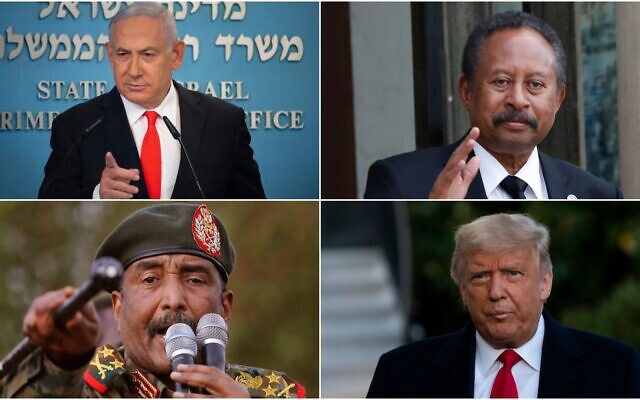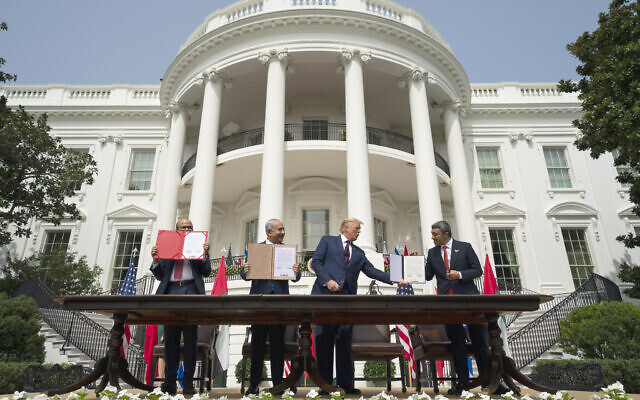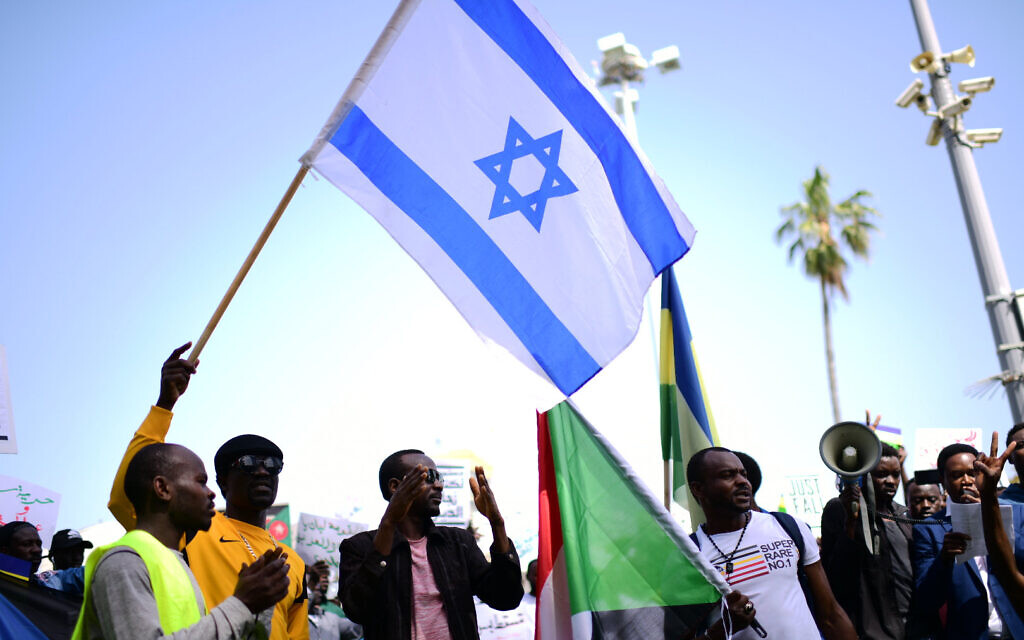The big, poor African state and the small, rich Gulf monarchies couldn’t be more different; for a start, unlike Bahrain and the UAE, Sudan actually went to war against Israel
Yes to removal of Sudan from the US list of state sponsors of terror. Yes to a billion-dollar aid package. And yes to normalization with Israel?
The remarkable tale of Sudan turning from a symbol of the Arab world’s rejection of the Jewish state, into its latest potential peace partner, could be summed up by referring to three no’s that, in the span of 53 years, look set to become three yes’s.
Many Israelis still associate Khartoum with the “Three No’s” — “No peace with Israel, no recognition of Israel, no negotiations with Israel” — formulated by an Arab League summit held in the Sudanese capital shortly after the end of the Six-Day War in 1967.
Get The Times of Israel’s Daily Edition by email and never miss our top stories Free Sign Up
Now, after months of pressure from the US administration, the culmination of efforts to get the Northeast-African Arab country to normalize relations with Israel appears closer than ever, perhaps just days away.
Earlier this week, the transitional government in Khartoum agreed to pay $335 million in compensation to the victims of the 1998 bombings of two US Embassies in Africa (Sudan didn’t perpetrate the attacks, which killed more than 4,000 people, but granted asylum to the terrorists). In exchange, US President Donald Trump vowed to remove the country from its lists of state sponsors of terrorism, where it has been since 1993.
Together with a massive financial aid package for the struggling country — the US has reportedly offered $800 million in aid and investments, but Sudan demands some $3-4 billion — the removal of the terrorism designation is largely seen as a precursor to a normalization deal with Israel.
US Secretary of State Mike Pompeo on Thursday spoke with Sudanese Prime Minister Abdalla Hamdok, applauded his “efforts-to-date to improve Sudan’s relationship with Israel, and expressed hope that they would continue.”

According to Hebrew media reports, Jerusalem and Khartoum will announce the establishment of diplomatic ties over the weekend or early next week.
Other reports indicated that Hamdok is willing in principle to normalize relations with the Jewish state, but insists his country’s yet-to-be-formed transitional parliament must first approve such a move.
Thus a Sudan-Israel deal seems to be a question of when, and not if.
Six Sudanese army companies fought nascent Israel in 1948
When that moment arrives, it would not only be another major foreign policy achievement for Trump and Prime Minister Benjamin Netanyahu nor merely another encouraging step on Israel’s path to fuller integration in the region.
Rather, it would mark a paradigm shift in Middle East politics. For one thing, Sudan, as opposed to Israel’s new friends in the Gulf, has a history of military conflict with Israel. And unlike the United Arab Emirates and Bahrain, it has not been long known to clandestinely cooperate with Jerusalem in various areas, including security and trade.
To be sure, the August 13 bombshell announcement that the UAE had agreed to establish full diplomatic relations with Israel was historic. It made public the hitherto covert alliance between Jerusalem and the Gulf states. It shattered the Palestinian veto over Arab ties with Israel.

And it paved the way for other Sunni Gulf nations to follow suit: Bahrain has already signed an agreement, in a move in turn welcomed by Saudi Arabia and Oman, who could also be in line soon for normalization.
But Sudan is a whole new ball game, not better or worse, but emphatically different.
For one, a warm yes from the capital known for the “Three No’s” would likely have a tremendous psychological impact on Israelis. “Those who used to reject us so bitterly have finally embraced us,” many might reasonably say.
More importantly, a peace accord with Khartoum would actually be that — a peace accord. The UAE and Bahrain — countries that share with Israel worries about Iranian belligerence and hence have long flirted with normalization — were never at war with Israel.
Sudan, on the other hand, has been a bitter enemy of the Jewish state since its founding. During the 1948 War of Independence, six Sudanese army companies joined the Egyptians in fighting the nascent Jewish state.
The animosity continued for seven decades. Until 2016, Sudan was a staunch ally of Iran, helping the Islamic Republic smuggle rockets and other weapons to Palestinian terror groups in Gaza. This prompted Israel to repeatedly bomb military facilities in the country, according to foreign reports.
A bridge between Arabs and Africans
Sudan’s regime is very different from those of the UAE and Bahrain. It’s on its way to becoming a democracy, while the two Gulf states will continue to be ruled by autocrats for the foreseeable future.
And Khartoum’s geopolitical situation could be very interesting for Israel, said Irit Bak, head of African Studies at Tel Aviv University.
“We now have diplomatic relations with most African countries, and an important country like Sudan, which is one of the biggest countries in Africa and also is kind of a bridge between Africa south and north of the Sahara, between Arabs and Africans in Africa, could be a huge benefit… in an effort to bring more diplomatic support to Israel in international forums,” she told the Jerusalem Press Club on Thursday.
More than 40 million Muslims
With a territory of 1,861,484 square kilometers (718,722 square miles), Sudan is 22 times bigger than the UAE and Bahrain together.
It has a population of 45 million, most of whom are ethnic Sudanese Arabs. The UAE, by contrast, has only 10 million inhabitants, of whom only 12 percent are Emiratis. (Bahrain has a population of 1.5 million, less than half Bahrainis.)
But bigger doesn’t necessarily mean better, and certainly not in economic terms. The UAE (GPD per capita: $68,600) and Bahrain ($49,000) are known as major international financial hubs. Sudan ($4,300) is known for an economy in shatters after decades of war and internal strife.

What about people-to-people relations? Emiratis seem genuinely enthusiastic about ties with Israel, and Bahrainis have largely welcomed their government’s agreement with Jerusalem as well, despite some protests by its Shiite population. Both countries have small but well-integrated Jewish communities that are supported by the government.
With Sudan, the situation is more complicated. Despite the recent establishment of a handful of pro-Israel groups advocating for normalization, hatred toward the State of Israel is still widespread.
According to Bak, the Africa scholar, a peace accord with Israel would be “quite controversial between many streams in Sudan politics and society” and may create “antagonism amongst many populations or civil societies in Sudan.”

The government-affiliated Islamic Panel of Scholars and Preachers, which advised the government on religious questions, ruled last month that Islamic law prohibits ties with Israel (a stance contradicted by one leading cleric, however).
There is no functioning synagogue in all of Sudan; in fact, only one Jewish family remains of what was once a thriving Jewish community.
The normalization process with Sudan will likely be complicated, uneasy and much slower than those with the UAE and Bahrain. But if concluded successfully, Jerusalem would finally have peace with a large and important country that for decades exemplified the Arab world’s war against the Jewish state.
To many Israelis, that may ultimately be even more meaningful than lucrative business deals and the prospect of vacations in luxury hotels.
Before it’s here, it’s on the Times of Israel
—————————————————————————————————————————————————————————–
Statements, comments or opinions published in this column are of those of the author(s) and do not necessarily reflect the editorial policy of Warsan magazine. Warsan reserves the right to moderate, publish or delete a post without prior consultation with the author(s). To publish your article or your advertisement contact our editorial team at: warsan54@gmail.com





